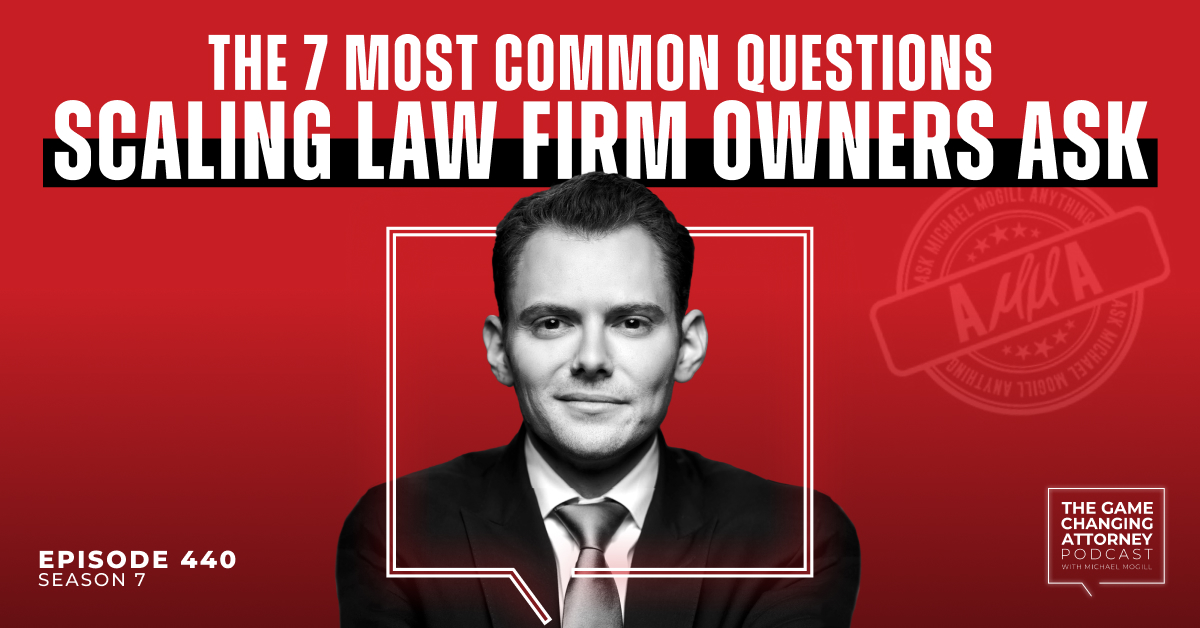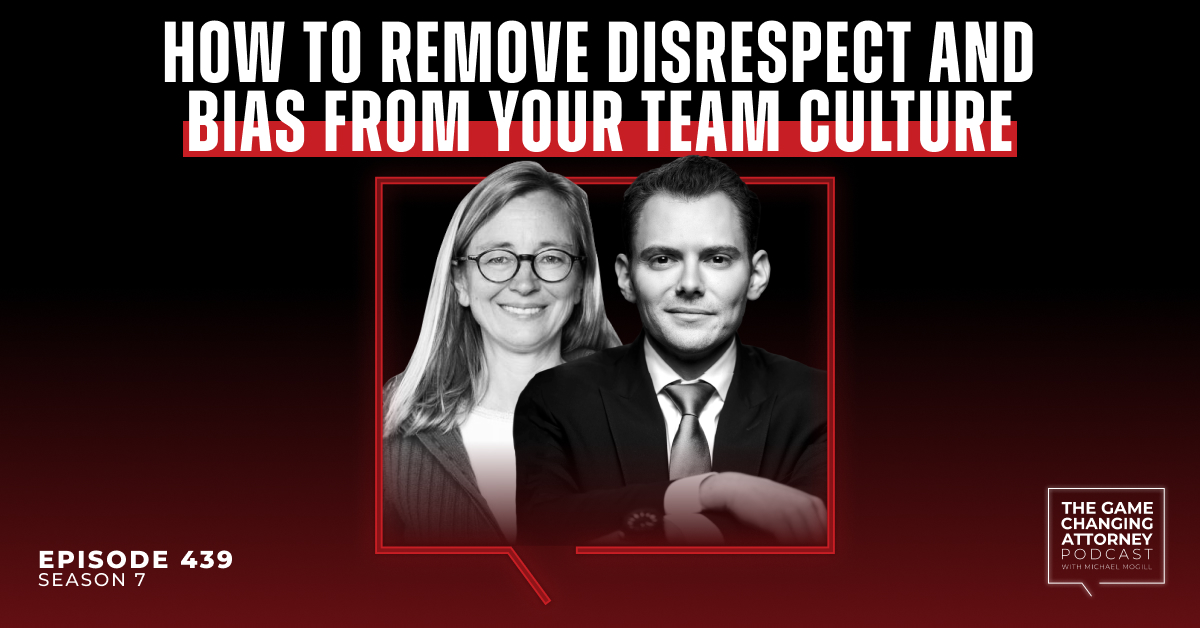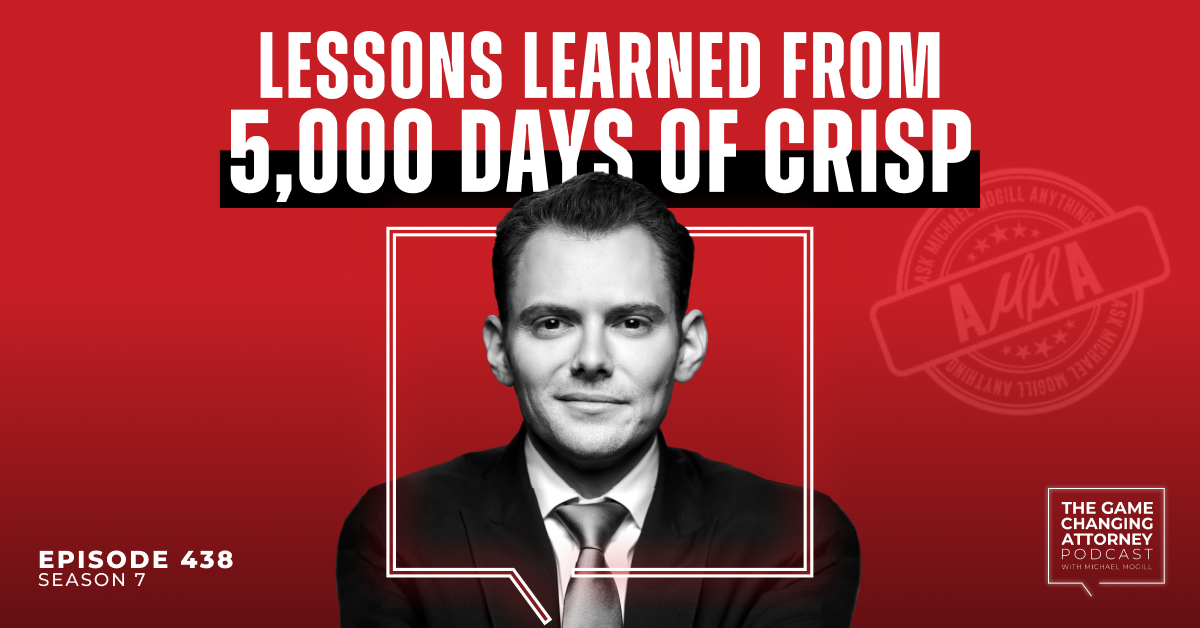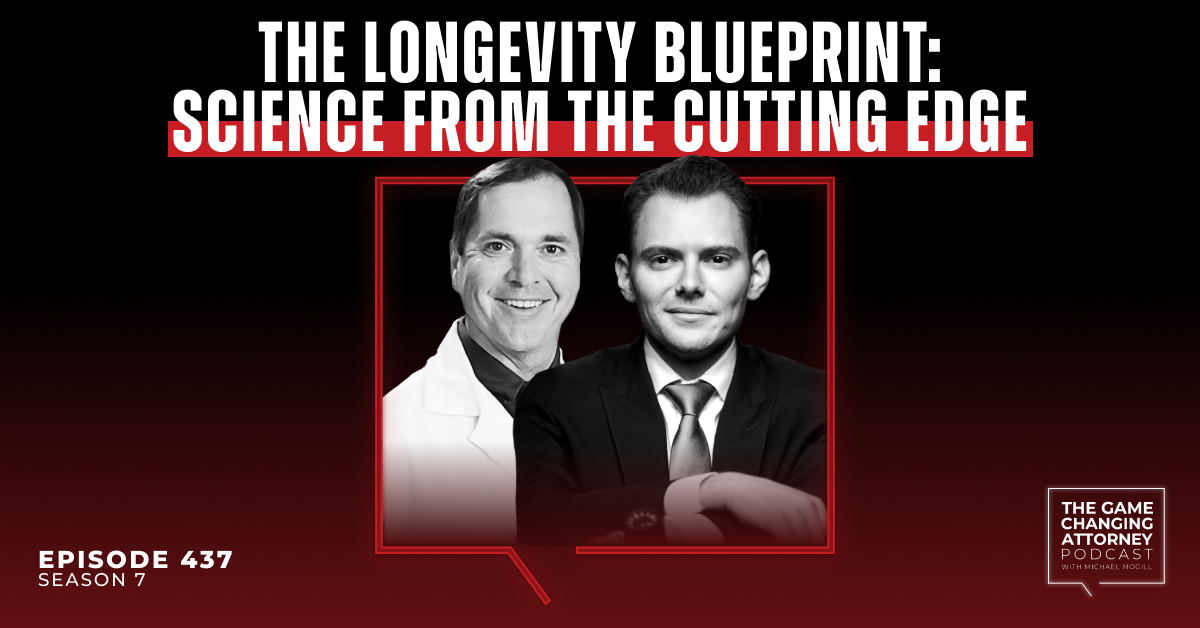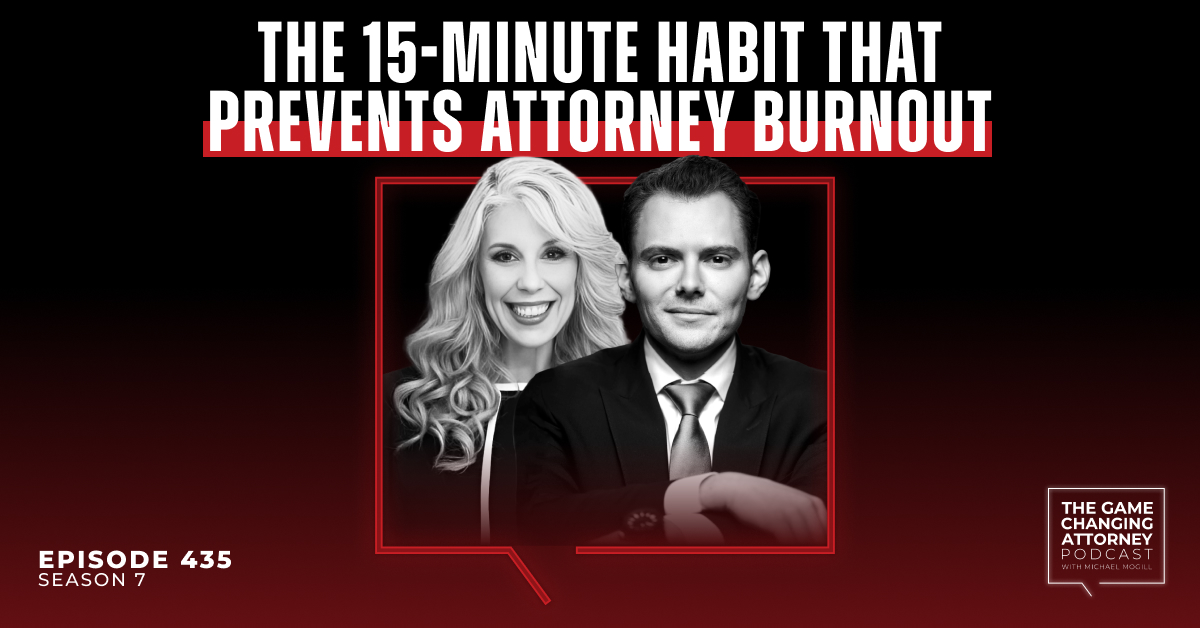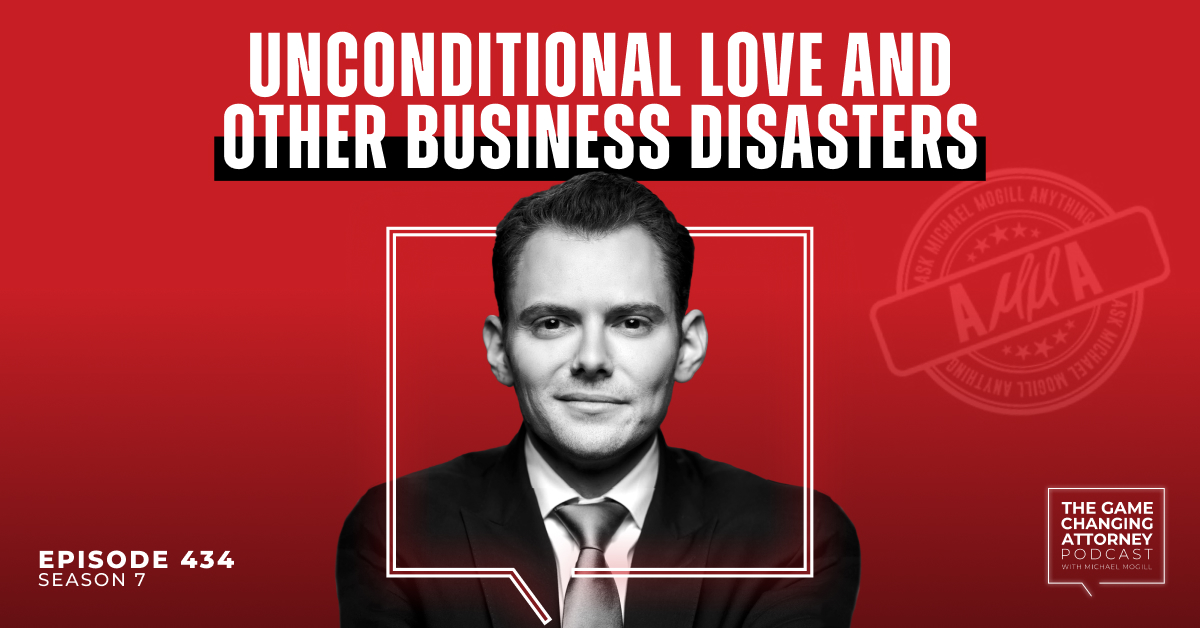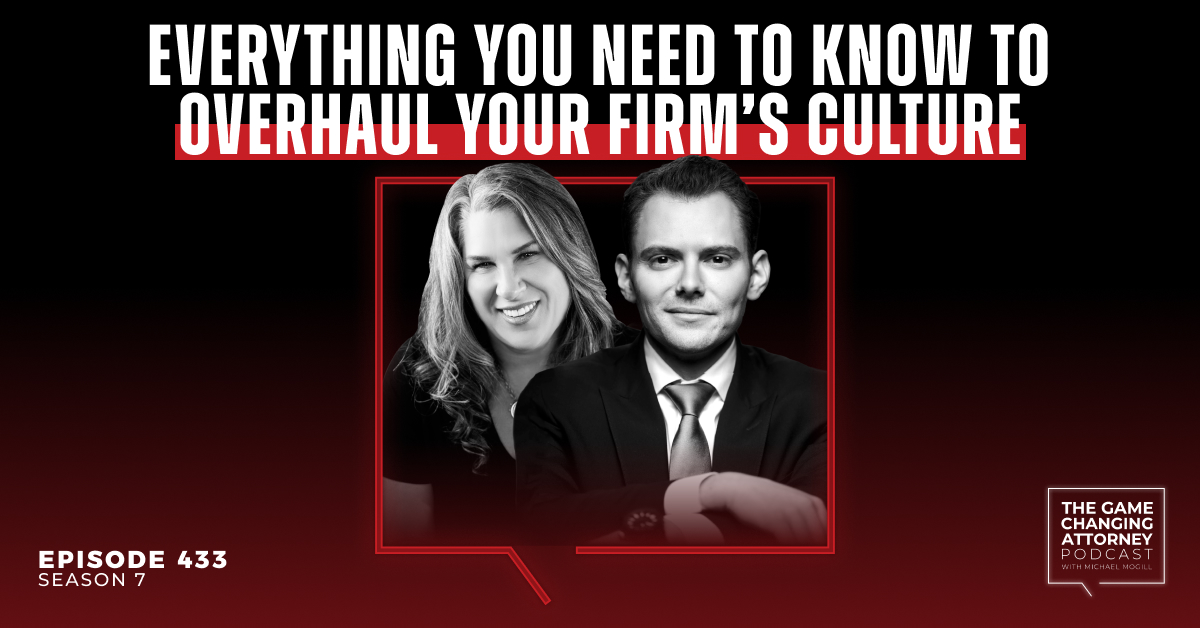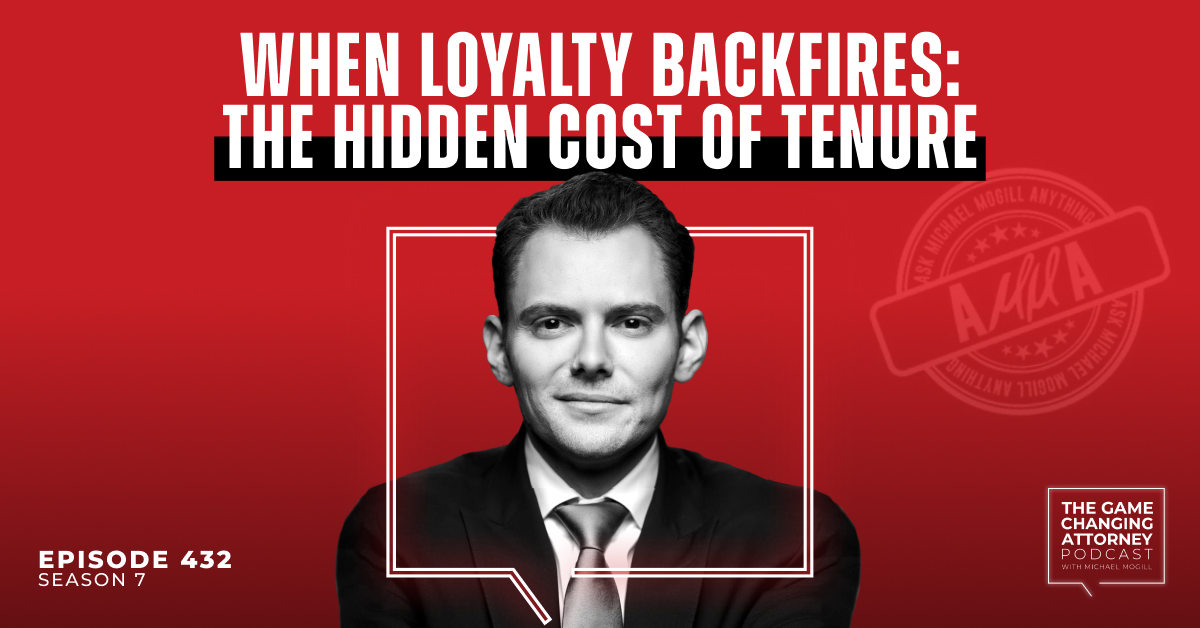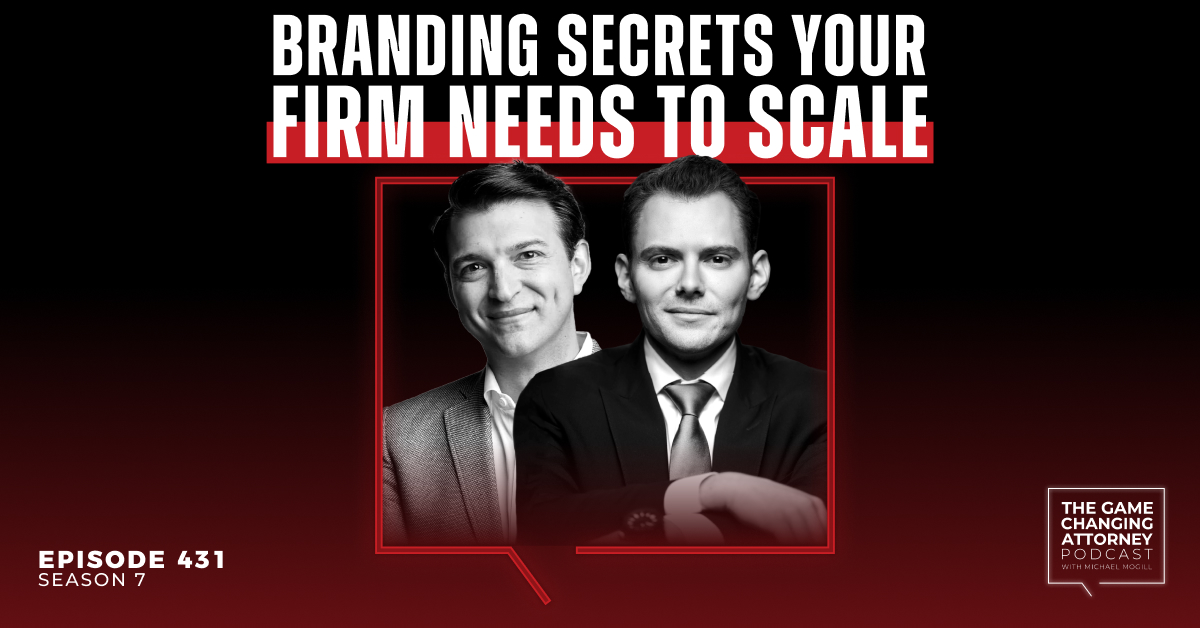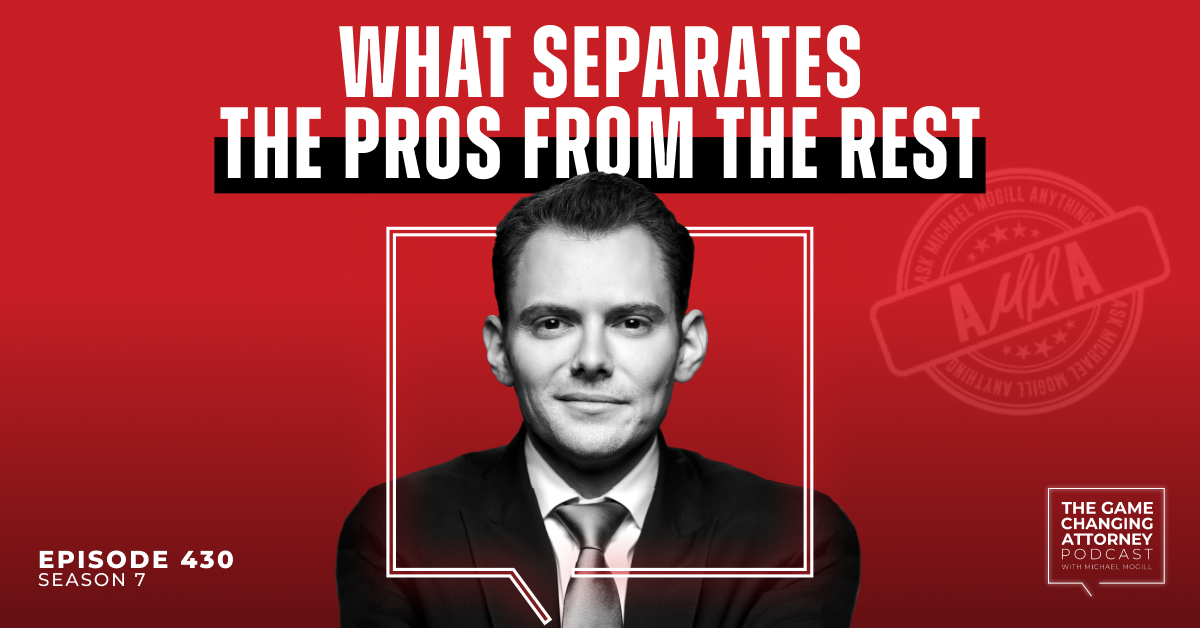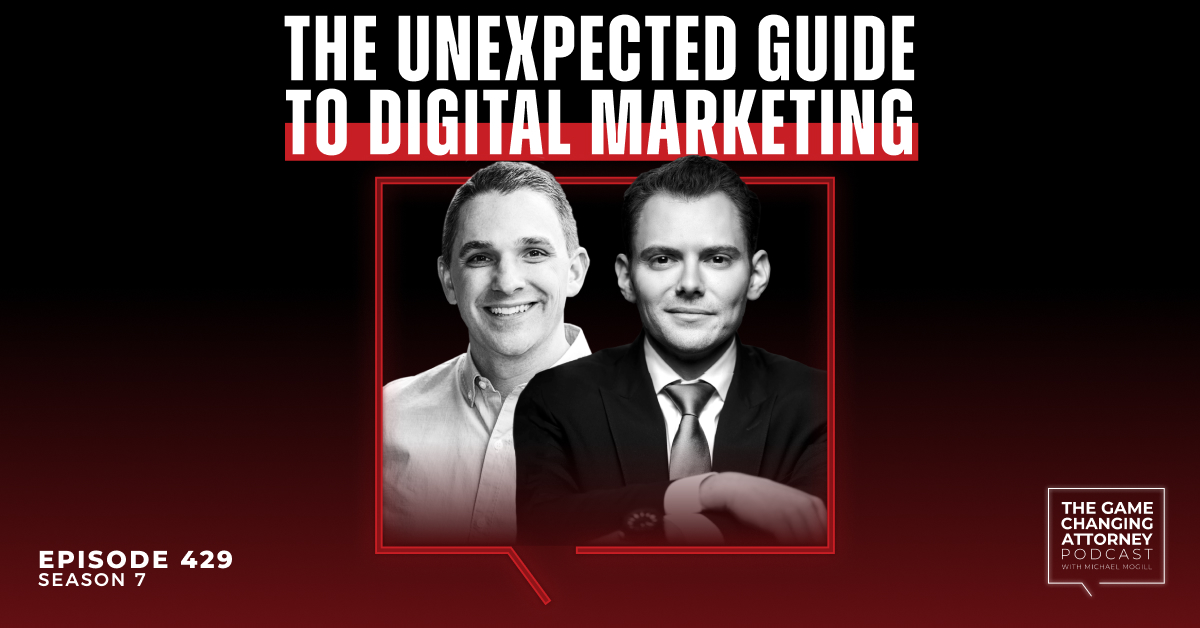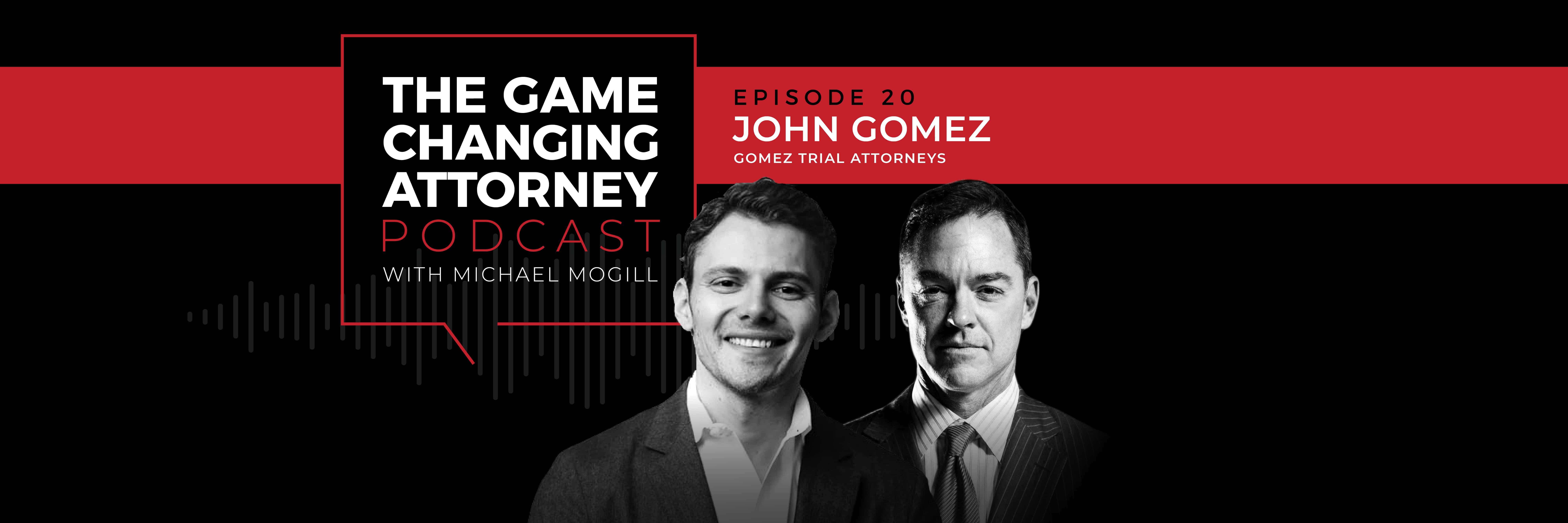
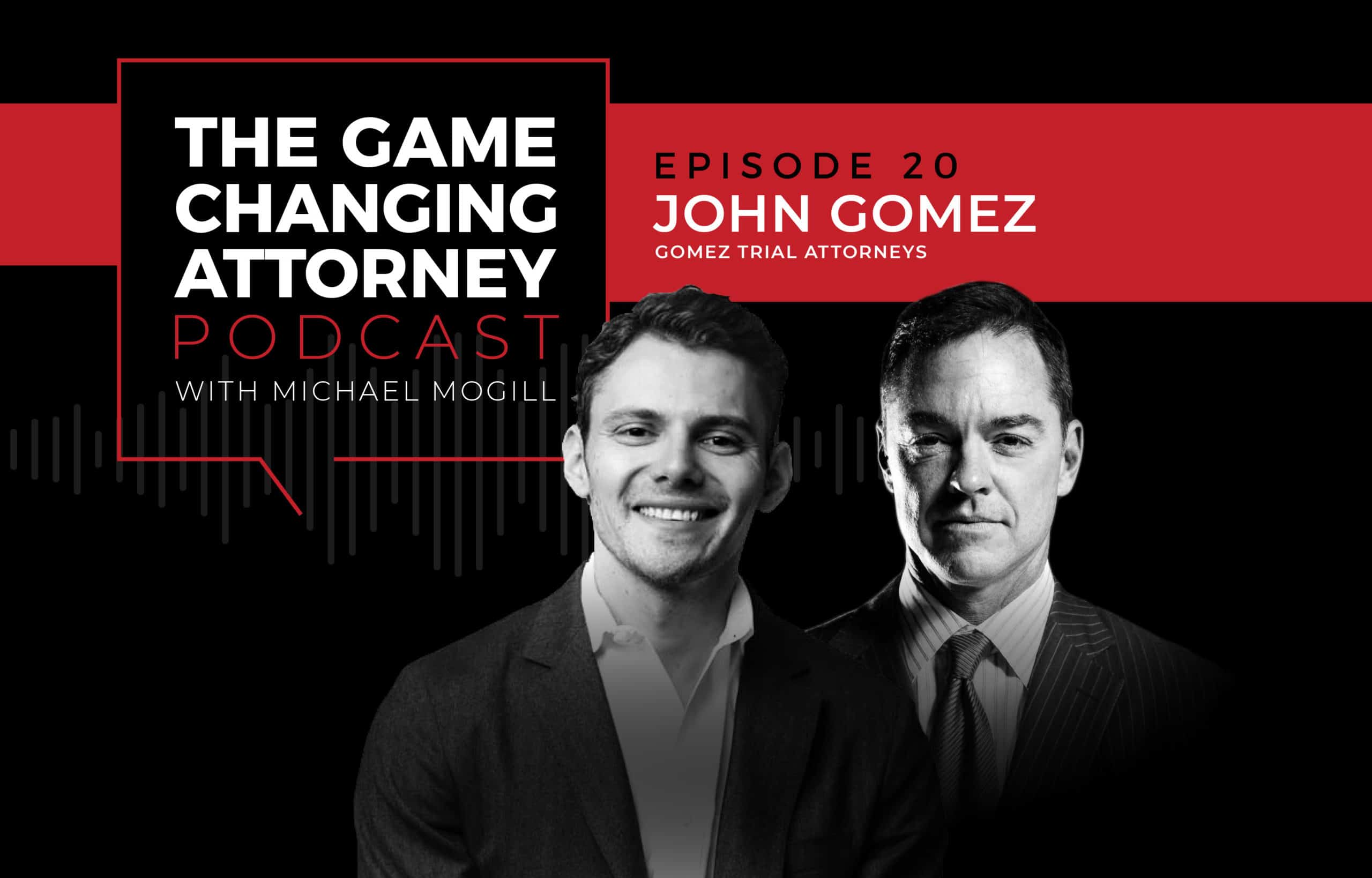
EPISODE 20 — John Gomez — Hardships Shape Champions
John Gomez has always been a fighter. He’s fought his way from a small-time lawyer to the leader of a powerhouse team of elite trial attorneys. He’s learned the hard way that there’s no shortcut to success, discipline is central to growth, and that the hardest times can be the very catalysts we need to unlock our full potential.
In this episode of The Game Changing Attorney Podcast, he shares his story of rags to riches to rock bottom to redemption — answering the questions:
- How did Gomez go from a small boutique firm to over a billion dollars in verdicts?
- What can trial attorneys learn from world-class athletes?
- How can supercharged perseverance help to overcome hardships?
- What did Gomez do to go above and beyond in the American Beauty case?
- and much more!
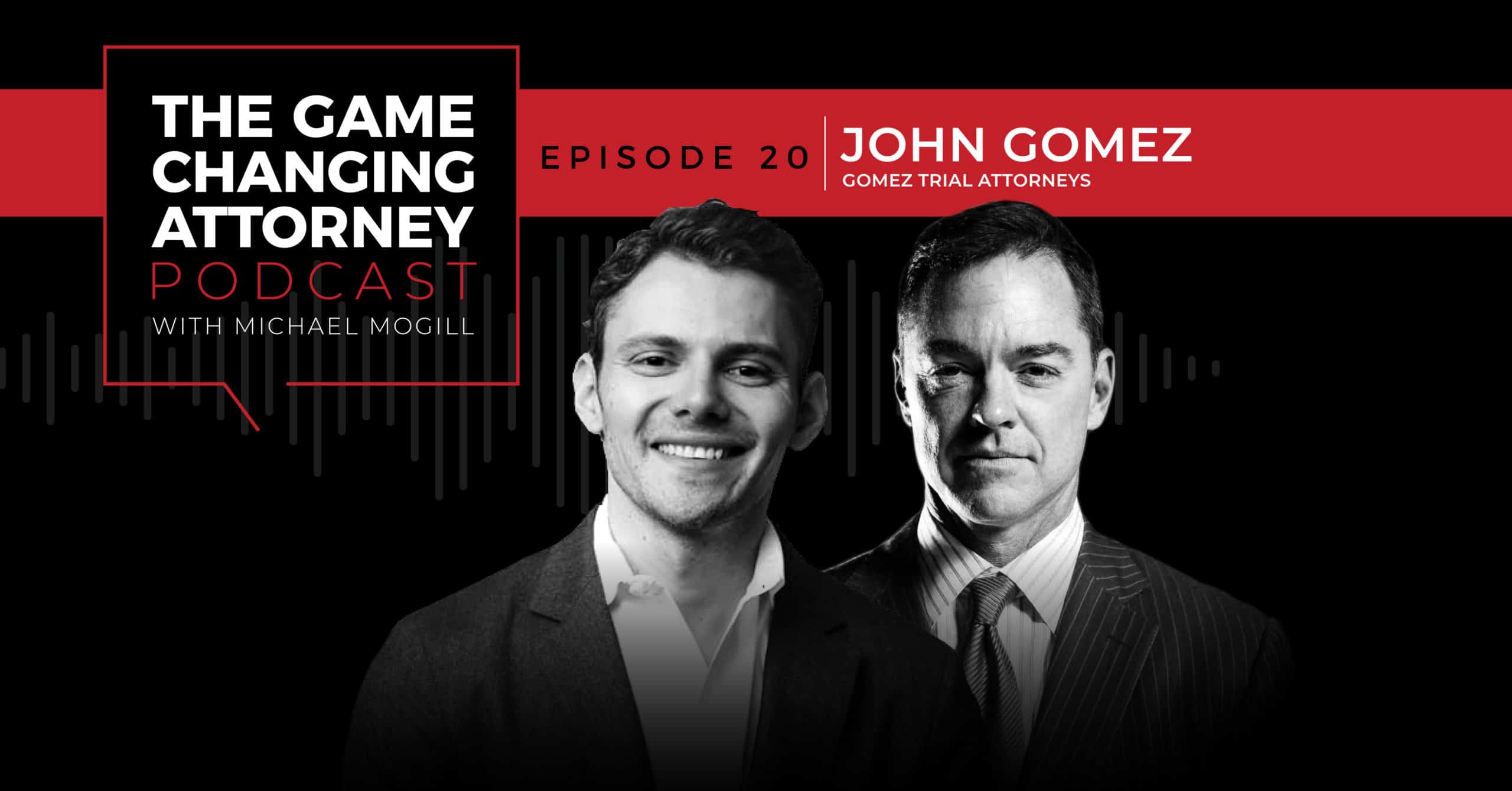
Listen & Subscribe
Show Notes:
1:59 – Making health a priority. “The first thing that I wanted to do when I opened the firm was to establish us as a real trial firm and myself as a real trial lawyer. So I devoted a whole bunch of energy to that, but at the same time I always thought that health was important. You know, I’ve always felt like my job as a trial lawyer and as the leader of an organization was to be present and available and physically able to do my job in the best way I possibly could. So I’ve always taken care of my health. I think I’m actually getting better at it now. I think there were a lot more late nights when I first started, a lot more sleepless nights and showing up after all nighters and that kind of thing, but I’m getting more and more away from that and more and more toward just my optimal peak performance in everything I do.”
4:16 – The case that started it all. “I was on my own starting the firm, and I had this very, very high profile case that he let me take with me involving a very high profile murder called the American Beauty Murder. It’s all over Oxygen Network — this beautiful blonde woman poisons her husband to death, and so there was a wrongful death case against her and the county of San Diego where she worked on behalf of her deceased husband. So we tried that case, and I remember we were basically on fumes. I had no money left. I had burned through my 401k. We burned through our savings. We were right at the bottom of things, but then the news was in there every day, gavel to gavel coverage, and we ended up winning a $106 million verdict. Things took off from there.”
7:40 – There’s no easy route to success. “I think certainly as you build a reputation, that’s the only choice. I have, I think, now eight verdicts of a million dollars or more in which there was zero offer pre-trial, just because those are the opportunities that were presented to me. And so as you come up, you’re not going to get sort of the easy layup cases. And if you want to develop a reputation as a trial lawyer, of course you have to try the difficult ones.”
9:34 – John’s attorney origin story. “Here’s why I became a lawyer, and it’s a little embarrassing and not that idealistic or whatever. This guy, we lived at the beach, and he would come home every day from his Locklear job at about two, and then we would ride our cruiser bikes down to the beach bars and drink and hang out and have fun. He was getting paid some ungodly sum of money, and they had these parties, and it seemed fun, and we played on the softball team. I said, ‘Oh, what a life. I want to be a lawyer.’ So now he’s the managing partner of Cooley Godward here in town, and it just turned out that I thought that looked like a pretty good life for a kid with no real professional aspirations, lawyers in my family, or anything else. And I just followed his footsteps.”
12:35 – Reaching new heights. “Only very recently have I really turned my attention to the important issue of the business of law. Now that I built the product, I’m really, really engaged in the business. And I’m hopeful that a few years down the line, people might see this story and go, ‘Wow, this firm was a smaller, very successful, but smaller trial firm — boutique. But now look at him.’ You know, that’s my goal.”
13:10 – How do you define success? “I define success, first of all, as being able to proudly look myself in the mirror every morning, being a good example to my children, helping our clients, and helping improve the lives of all of our employees, you know? I feel like we have a responsibility to a large community. And so for me, success is defined in terms of my ability to lead, inspire, and improve the lives of as many people as possible.”
15:22 – The Trial Lawyers College. “It’s an institution based on a ranch in Dubois, Wyoming, and was founded by Jerry Spence. And at the time the president was this guy, Jude Becil, who is currently a lawyer of counsel with my firm. So I had some trial success, he invited me to come, and I said, ‘Okay, I’ll go.’ You go out there for like 30 days, you’re on a ranch, you really don’t have WiFi, you don’t have computers, and you’re really engaged in a journey to find your true vulnerable self. There’s a lot of self-exploration. They engage in this process called psychodrama, which can get pretty intense. And you make these friendships and relationships for life. I think the primary takeaway is it allows you to be very comfortable with yourself in front of a jury or just with other human beings.”
18:20 – Separating great from the good. “The people I really admire have very different styles and approaches. Like you had Mark Lanier on — he’s a huge hero of mine. Brian Panish out here in California is a friend of mine, and a guy I admire a lot. There are tremendous female trial lawyers too, so different styles, different looks, different genders. But I think the consistent thing is that they have a commitment to excellence, and they work really hard at it, and a lot of people don’t see that. They say, ‘They’re just naturally talented,’ and maybe there’s a little bit of that, but I think it’s all hard work. I think it’s just commitment and repetition and hard work that really defines the great trial lawyers. It’s not exactly like an athlete because there are freak athletes that can just go out and be freak athletes, but the Hall of Famers are the ones that worked on their craft. And I would say the same thing with trial lawyers.”
19:59 – Application is the most important. “The important thing is you’ve got to keep doing it. You can’t just step back and stop trying cases, because there’s no substitute for that. Like right now, everybody’s watching webinars at home in their living room, and they’re getting better at trying cases maybe a little bit, but not really. I think they’re getting worse because they’re not really trying cases. It’s like being a fighter to me. You’ve got to be in the gym. You can watch all the videos about how to fight that you want, but if you’re not in the gym, fighting and training and sparring, then you know you’re losing ground.”
25:11 – On approaching adversity. “You know, I think I’ve always been a person of perseverance. I’ve faced difficult circumstances in my life. I’ve been without food. I’ve been dealing with bad people in my life. So having difficulties managing a law firm, in the larger sense, to me was always temporary. I always thought I could get through that, and I’ve always had confidence in my own ability to make things right. And I just said, ‘Look, I’m going to grind and grind. I’m going to make decisive action, and then I’m going to grind, and I know we’re good and we’re going to come out fine.’ It was a combination of perseverance based on past hardship with a confidence in the future.”
29:07 – Gaining back his discipline. “I have always been disciplined in terms of training. I’ve been a martial artist for a long long time and I was a college athlete, and so I would always stay pretty healthy. But I would say alcohol consumption and use of other substances and my lifestyle got out of hand for a while, and that caused me to become a whole lot more disciplined in terms of my self care and sort of self centering and, you know, healthy lifestyle. So, I have developed a lot more discipline than I had back then, but even in high school and college I was always the hardest working athlete on any team that I played on. So I had that, but I just got a little off track.”
30:47 – A story of redemption. “I think maybe there was a period of my life where I earned it, you know, where people did not like me — some with good reason. I have always tried to be nice to everybody, but I was a bit of an ass. But even now there are people that dislike me, and so is it a redemption story? Yeah, I think you can’t help but feel that a little bit. And I’ve gotten to the point where I don’t really care if people don’t like me. I know the life that I live. I know how I try to help people. I feel like I was on the rocks so much, but God interceded and chose me and saved me from a lot of harm or death or just not being around, and I owe it to Him and to myself and to everyone to give it back in a positive way. So yeah, I feel like it’s a good chapter in my life right now.”
33:28 – How he stays at the top of his game. “I do this thing called Morning Routine. Every morning I get up at about 4:20 and I do transcendental meditation — I’m trained in that. Then, I pray and read the Bible for a little bit, and that kind of starts my day off right. I try to do something physical pretty much every day. I am a big fan of Jiu Jitsu, and I do Judo, which is very similar. I do Bikram hot yoga, which is to me very good for an older guy like me. If I do that during trial, I’ll go in and I’ll be doing the yoga, and then all of a sudden, just this thought will come to me that clarifies everything. So otherwise, I try to spend super quality time with my kids. I take them to their soccer practices or whatever practices and I try to watch all their games. I’ve coached them all. I try to get quality time with the people around me. I try to get good sleep, eat well, and not ever go to a club or stay late at a bar, ever. So that’s basically where I’m at right now.”
35:04 – Smashing ego with Jiu Jitsu. “The thing I like about it is that it just crushes me. Where I train, everybody’s better than me and everybody’s younger than me. I like to do things that when I’m driving there on the way. I’m a little scared — like that adrenaline kind of gets in you and you’re like, ‘Oh shoot, what’s going to happen? Am I going to get my ass kicked today or am I going to survive?’ I think that’s a great thing for anyone that has had any kind of success in any other aspect of their life because on the mat, they couldn’t give a shit about any verdict or what kind of house I live in or anything like that. I think it removes a lot of ego in life, and then once you get into court, it provides you with confidence, but I think it removes an ego because you are completely worthless. You’re trying your best and you’re doing your best. I don’t want to overplay it, but it’s certainly an ego smashing activity for me.”
38:34 – What does being a game changer mean to you? “For me, it means that you know whether another person’s a game changer for me or I’m a game changer for them to me, it means that this person is a person others will look to and emulate in some regard. And so, you’re not only changing the game, you’re changing someone else. For me, there’s been many game changers that have changed my outlook on business and life, and to me that’s really what a game changer is — a person that others look to, and they say, ‘Wow, look at the way they do that, or approach that or explain that. I want to be like that, I want to copy that, I want to emulate that.’ To me, that’s not only a game changer — that’s a life changer.”
EPISODE RESOURCES
American Beauty Case
Mark Lanier
The Trial Lawyers College
Cooley Godward
Brian Panish
Joe Fried
Jiu Jitsu
Judo
Bikram Yoga
Connect with Michael
- Text directly at 404-531-7691
